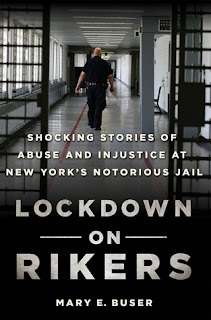LOCKDOWN ON RIKERS: Shocking Stories of Abuse and Injustice at New York's Notorious Jail
Mary Buser began her career at New York's Rikers Island as a social work intern brimming with ideas, ready to make a difference, and eager to help incarcerated women find a better path for themselves. Her initial experience working with mothers in the nursery and women in the Mental Observation Unit was rewarding, and she returned to Rikers for full time employment after finishing graduate school. But her second time around was radically different: assigned to a men's jail, her return coincided with the dawn of "stop-and-frisk" policy, unprecedented arrests, and the biggest jailhouse movement in history.
Committed to the possibility of growth for her charges, Buser tried to keep the new regime at bay-yet soon her patients began arriving to their sessions with bruises, black eyes, and punched-out teeth, whispering that they'd been beaten by officers. And-because of the anxiety surrounding their respective legal cases and the sheer impossibility of their release-they refused to report it. As she was transferred between different jails, including the Mental Health Center and the dreaded "solitary," she saw horrors she'd never imagined. Finally, it became too much to bear, and Buser escaped Rikers and never looked back-until now.
Lockdown on Rikers shines a light into the deepest and most horrific recesses of the criminal justice system, and shows how far it has really drifted from the ideals we espouse.
More on the author:
MARY BUSER worked as the Assistant Unit Chief in the Mental Health Department on Rikers Island from 1995 to 2000. Prior to that, she cofounded the Samaritans of New York suicide prevention hotline, directing the community-based organization from 1984 to 1990. Today, Buser is an outspoken advocate against the inhumane treatment of the incarcerated, especially the mentally ill. She is a member of a national social work taskforce seeking to bring reform to the practice of solitary confinement, and works in conjunction with the Urban Justice Center and the National Religious Campaign Against Torture.
My Review
My Review
| I don't really follow world events, so to be honest I have not read any of the articles on the treatment of the prisoners at Rikers. So going into this book I had an open mind. I think this was an advantage to me as I was able to get a glimpse of what author, Mary Buser saw and experienced during her time at Rikers. I have to give Mary props as it takes a special kind of breed of people to do the type of job that Mary and her co-workers offer to prisoners in the judicial system. Which I imagine there is injustice happening in the prisoners but the media does not report it because who really wants to hear about the criminals getting treated badly. I know when I think of that I don't feel sorry but then again I am imagining serial killers and not the petty criminals, who are in jail for things like drug problems and petty thief. I was hoping that Mary would disclose more details about the injustice but what I did read did open my mind to the fact that the mental help problems that we have in place are not enough and we need to strengthen them as mental health is a serious problem like drugs and alcohol. |




Comments